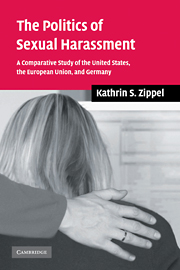 The Politics of Sexual Harassment
The Politics of Sexual Harassment Book contents
- Frontmatter
- Contents
- List of tables
- Preface
- List of abbreviations
- 1 Sexual harassment and gender equality
- 2 Equality through litigation: sexual harassment in the United States
- 3 Diffusion through supranational actors: sexual harassment in the European Union
- 4 The political path of adoption: feminists and the German state
- 5 “Good behavior versus mobbing”: employer practices in Germany and the United States
- 6 Social movements, institutions, and the politics of sexual harassment
- Appendix A List of cited interviews
- Appendix B Data collection
- References
- Index
5 - “Good behavior versus mobbing”: employer practices in Germany and the United States
Published online by Cambridge University Press: 22 September 2009
- Frontmatter
- Contents
- List of tables
- Preface
- List of abbreviations
- 1 Sexual harassment and gender equality
- 2 Equality through litigation: sexual harassment in the United States
- 3 Diffusion through supranational actors: sexual harassment in the European Union
- 4 The political path of adoption: feminists and the German state
- 5 “Good behavior versus mobbing”: employer practices in Germany and the United States
- 6 Social movements, institutions, and the politics of sexual harassment
- Appendix A List of cited interviews
- Appendix B Data collection
- References
- Index
Summary
Because my study of German employer practices has been discussed on the internet, I received emails from several American women in Germany who experienced sexual harassment on the job there and sought my advice because they did not know where else to turn. One woman was shocked when she found male colleagues (including her supervisor) surfing pornographic websites together. She had experience working in male-dominated environments, but she quickly became aware of different cultural norms of acceptable and unacceptable behaviors even in male-dominated organizations.
Not only American women but anyone working in a German business would be unlikely to know their rights and where to turn. This is because even though sexual harassment is now illegal in Germany, as in most other European Union countries, employers have taken little action against it. The politics of sexual harassment is politics as usual in Germany. Women have not used the law to hold employers or harassers responsible in court. Public-sector employers have gender equality officers, and the problem falls into their area, but most private-sector employers do not. Some public employers and a very few private ones have adopted broader, union-negotiated, general anti-mobbing policies that include sexual harassment. In larger workplaces works councils can act on behalf of employees in workplace conflicts. There are, however, no state offices to file complaints and few services specifically for victims, though an industry for victims of mobbing has emerged, including hotlines, attorneys, coaches, and psychologists, as well as consultants for employers and unions.
- Type
- Chapter
- Information
- The Politics of Sexual HarassmentA Comparative Study of the United States, the European Union, and Germany, pp. 158 - 201Publisher: Cambridge University PressPrint publication year: 2006


